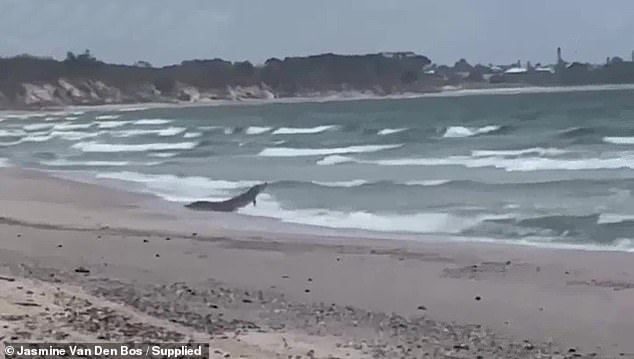A photo of a crocodile battling the waves at a popular beach has shocked locals and sparked an urgent search for the reptile.
The crocodile was reportedly seen five times at Coonarr Beach at the mouth of the Elliott River, near Bundaberg, in central Queensland on Thursday.
Jasmine Van Den Bos was stunned to spot the crocodile battling the ocean waves while taking her dog for a walk.
‘I just couldn’t believe my eyes … [it] was just a bit of a shock,’ she told the ABC.
‘I was freaking out.’
Ms Van Den Bos, who has swum at the beach many times, said the crocodile’s presence means she might forgo swimming for a while.
David Andreoli said he saw the crocodile’s head sticking out of the water while he was walking with his wife along the beach.
The reptile, which he said was between five to six feet in length, ‘spun around and went back into the ocean’ as they came closer.

Locals were stunned to spot the crocodile battling the waves at a popular beach in Queensland, outside the boundaries of what the state considers ‘Croc Country’ (pictured)
The crocodile is currently outside the boundaries of what is considered ‘Croc Country’ in Queensland.
These known saltwater crocodile habitats start from the Boyne River south of Gladstone and extends north to the Torres Strait and across the Cape York Peninsula.
Crocodiles sometimes venture outside of Croc Country, however sightings are rare.
The Queensland Department of Environment, Tourism, Science and Innovation said in a statement they are investigating the reported crocodile sightings.
Wildlife officer Alexander Peters said officials are contacting locals who made reports and that signs warning of the sightings will be installed at the beach.
He explained that when crocodiles are spotted at a beach or a river, the reptiles are moving from one estuary to another making them difficult to trace.
‘As part of our investigation, wildlife officers will conduct site assessments, including vessel-based searches and spotlight assessments of the area,’ he said.
‘While the investigation is underway, people in the Wide Bay region should be vigilant around the water, which means keeping children close and keeping dogs away from the water’s edge.’

The reports of the crocodile sightings at Coonarr Beach (pictured) is outside of the areas considered ‘Croc Country’ in Queensland
The last known confirmed sightings of the reptile outside of Croc Country was when two large crocodiles were removed from the Mary River in 2013 and 2014.
Crocodile sightings can be reported by using the QWildlife app or be completing a crocodile sighting report on the department’s website.






